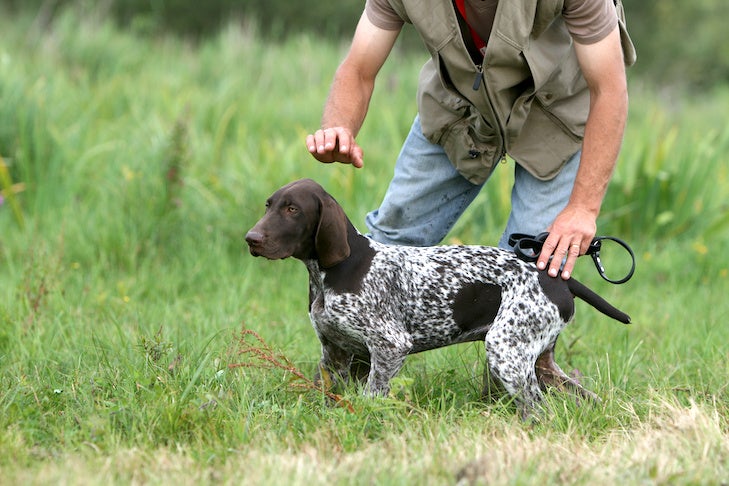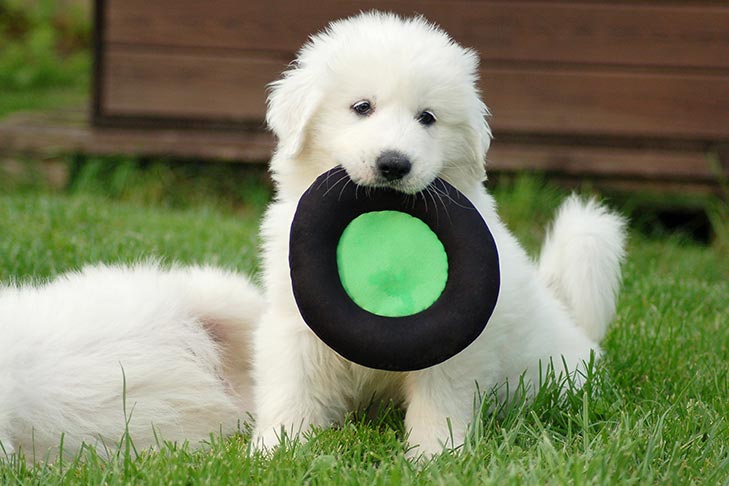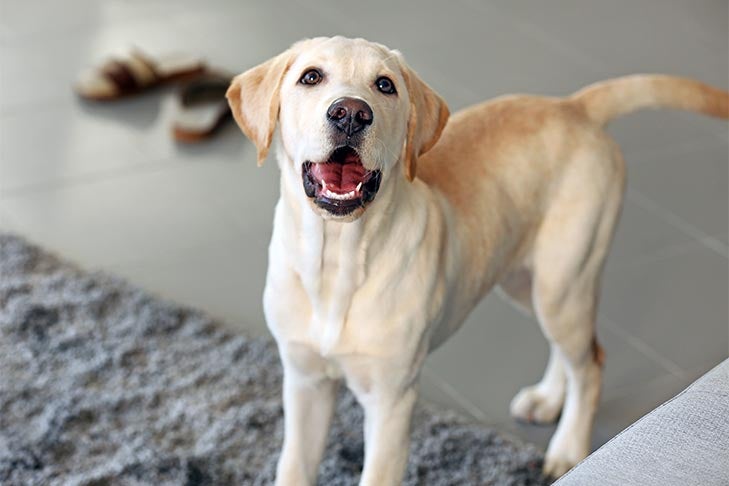
Puppies, like human babies, do a lot of learning to do in their early months, especially when it comes to navigating their new environment and adopting good manners.
For tips on how to facilitate that learning, we turned to certified dog trainer Kate Naito, who is also an AKC Canine Good Citizen Evaluator and Manners Program Director at Doggie Academy.
The first thing to do before training begins
Before you even start training a puppy, it’s important to focus on your little one’s emotional health, says Naito, “That means making sure you create an environment in which your puppy feels safe around you.”
Puppyhood training, she says, comes down to two key components:
- Relationship building
- Creating structure
After all, once a loving and trusting bond exists, it’s much easier (and enjoyable) to teach your dog specific behaviors and commands, such as “drop it” and “heel.”
Growth stage: between 8–16 weeks
Training goal No. 1: Exposure to the environment
At this critical socialization period that ends by 16 weeks, puppies are students of life, Naito explains. They’re curious—and should be learning—about how the world around them works, specifically what things look like and sound like. For that reason, Naito generally focuses on exposing puppies to their environment first before diving into obedience training.
She recommends making sure puppies become familiar (and comfortable) with:
- Surroundings: Including traffic noises, public transportation, car rides, passersby of all ages and shapes, and other dogs.
- Activities: Including visits to the vet and body handling.
“The goal is to teach a puppy that the world is a fun, not scary, place,” she says.
Training goal No. 2: Impulse control
The first true behavior training lesson for puppies at this stage should be basic impulse control. “This can come in many forms,” Naito explains, “but most new owners start with a simple ‘sit.'” She likens a puppy learning to sit on command to a young child learning to say, “Please, may I have that?” instead of, “Gimme that!”
At a minimum, families should get puppies into the good habit of sitting before meal time. Ideally, you should also take things further and integrate the behavior into playtime by having your puppy sit before playing a game. “This kind of training can start as soon as your puppy comes home (as early as eight weeks), provided you plan to use positive-reinforcement training,” says Naito.

Puppy stage: By 6 months
By this age, your growing puppy should be well-versed in several lessons.
Training goal No. 3: Polite play
Puppies who learn the lesson of polite play know when to stop (and can follow the “drop it” command), what’s off-limits, and understand what “no biting” means. While your puppy is still teething at this stage and likely has a strong desire to bite and chew things, they should know which household items are toys for playing and which objects are not—for instance, your body and clothing.
“Of course, all this must be done using force-free training,” says Naito.
Training goal No. 4: Housetraining
“This may be a work in progress for several months, but your puppy should be making steady progress with going potty in the appropriate places,” says Naito.
Training goal No. 5: Being alone
Whether through crate training or leaving your puppy in another type of safe, enclosed place, Naito says the goal is to ensure your puppy can stand being left alone for short periods of time.
Training goal No. 6: Recall
Getting dogs to respond to the command “come” early on is important, says Naito. “Even if your puppy doesn’t have a rocket recall, the important thing is that he loves coming right up to you.”
Training goal No. 7: Continued impulse control
By this age, puppies should ask politely for all of their favorite things by sitting first—that means sitting before getting food, engaging in playtime, and so on. “If your puppy is barking, jumping, or nipping for your attention, you’re setting him up for trouble as he gets bigger and stronger,” says Naito.

Growth stage: By one year
By the time they’re one year old, dogs should be making progress in learning of all the polite behaviors they will need for the rest of their lives.
Training goal No. 8: Mastery of these basic behaviors
Naito explains that while the “basics” will vary based on your dog and your environment, these typically include learning to:
- Sit, down and stay (even with distractions)
- Come when called (particularly when off-leash)
- Loose leash walking
- Drop it and leave it
Is it ever too late to teach a dog?
While Naito says it may not be too late to teach particular behaviors beyond puppyhood, this stage is critical—particularly the first three to four months—when it comes to building that emotional foundation.
“If a puppy learns not to trust humans—maybe because they yell and punish, steal his food dish to establish dominance, or force him into scary situations—you will have an uphill battle teaching life skills later on,” says Naito.
Dogs who are afraid of people will have a harder time coming when called. And those who think people may steal their toys won’t be as likely to “drop it” when asked.
You can make progress, Naito adds, but it’s easier to train dogs who start out with a foundation of trust and clear communication. And it’s easier to teach young puppies behaviors like gentle play than it is full-size dogs.
But through positive-reinforcement training, it’s possible to help dogs of any age recognize that it can be fun to behave politely. “In many cases, you can reverse rude behavior quickly by teaching a new, enjoyable way to behave,” she says. In other words, your dog won’t be as likely to run off with your socks if the alternative is to “drop it” and get a treat.
Every dog and every dog’s environment is different, so keep in mind that key training milestones will vary based on your particular dog and your surroundings.
About Purina Pro Plan
Purina Pro Plan is a leader in the advanced nutrition category, with more than 140 targeted formulas to help your pet thrive throughout every stage of life. For more information, visit www.proplan.com or follow @ProPlan on Twitter, Instagram, or Facebook.


